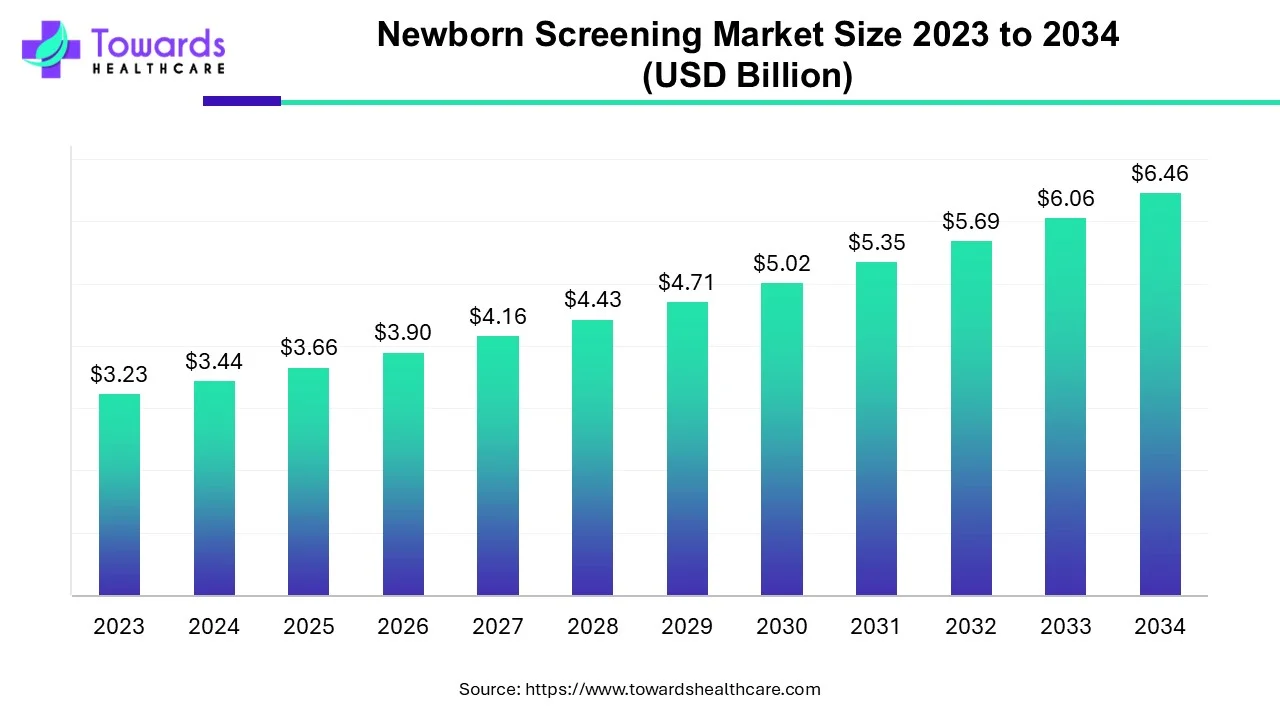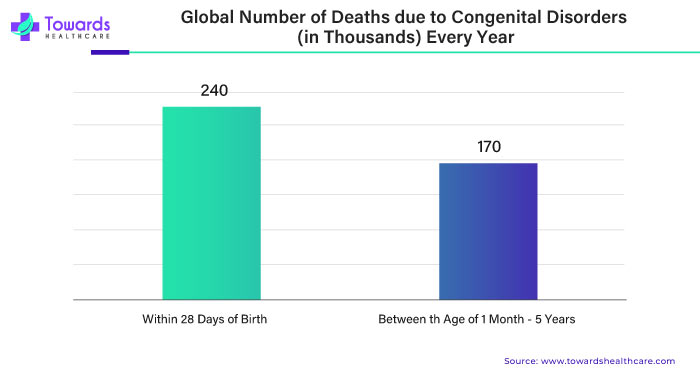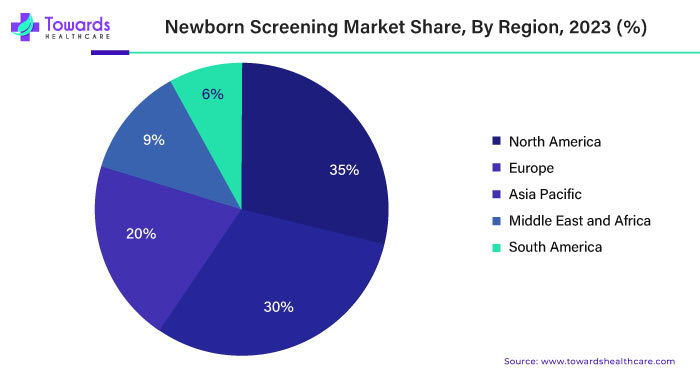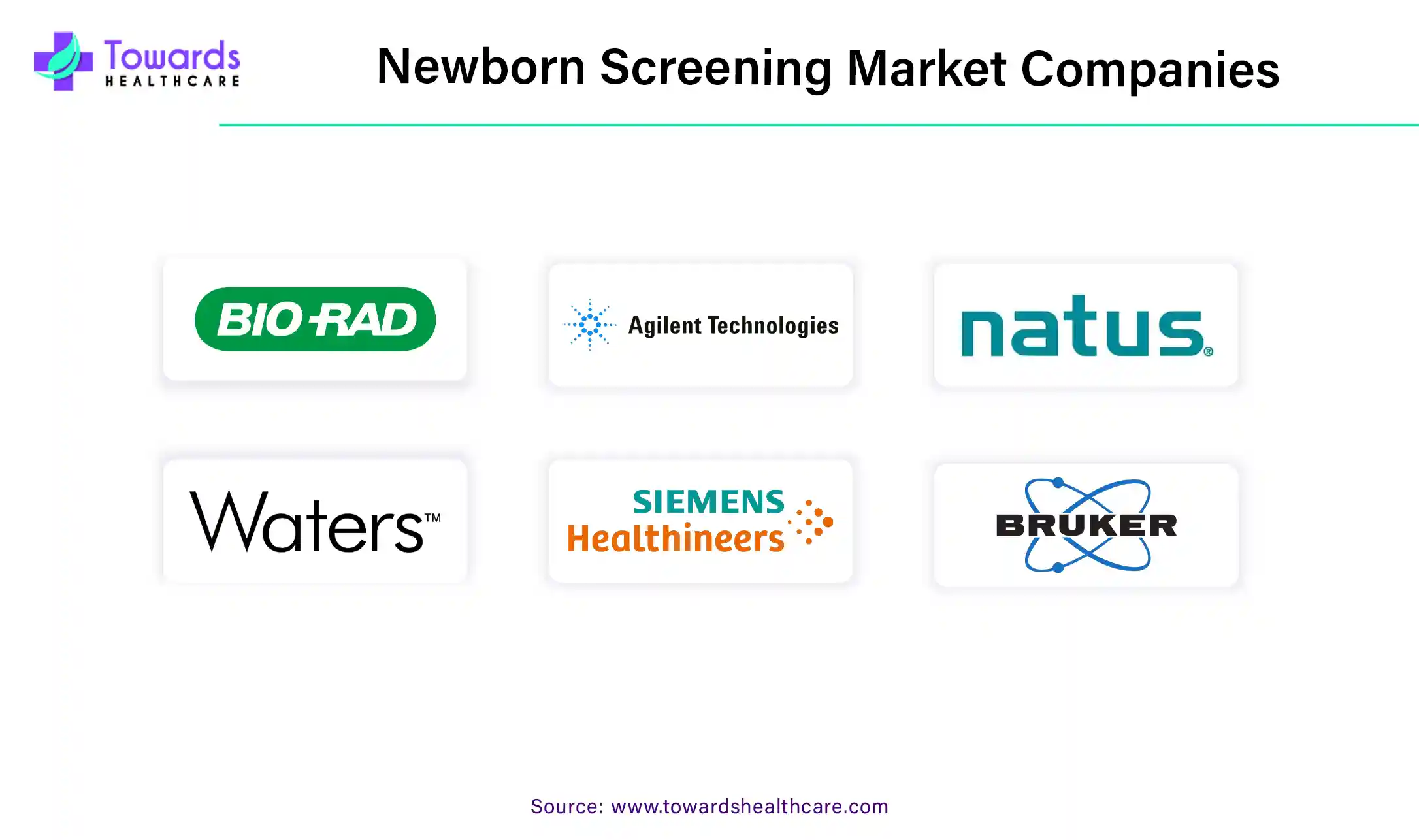January 2026

The global newborn screening market size is calculated at USD 3.44 billion in 2024 and is expected to be worth USD 6.46 billion by 2034, expanding at a CAGR of 6.5% from 2024 to 2034.

United States reports 1 in 33 babies born with birth defects every year. In India, around 200,000 babies are born with congenital heart disease annually. Newborn screening is effective in spotting congenital heart disease early, allowing for better treatment outcomes.
Newborn screening is a very important test that doctors perform on babies soon after birth. This test is like a safety check to ensure the newborn's health. Sometimes, babies can have specific health problems that are not easy to see initially, but the screening test can catch them early. When doctors find these problems early, they can start treatment quickly to keep the newborns healthy and happy.
The test is simple and safe. It usually happens within a few days of the newborn's birth. A small amount of blood is taken from the newborn's heel during the test. It might make the baby cry briefly, but it doesn't hurt much, and it's over quickly. This blood sample is then sent to a special lab, where experts check it for signs of certain health conditions.
One of the things doctors look for in the blood sample is called metabolic disorders. These are problems with how the body breaks down food into energy. If a newborn has one of these disorders, it can cause serious health issues, but with early detection, doctors can give the newborns unique treatments and diets to keep them healthy.
Newborn screening can also find out if a newborn has hearing loss. Even though babies can't tell us if they can hear, the screening test can determine any hearing problems early on. This means that parents and doctors can work together to ensure the newborns get any help they need to learn and develop properly. Sometimes, the screening test can even find certain genetic conditions. These health problems come from the genes a baby gets from their parents. By discovering these conditions early, doctors can start the right treatments and help the baby grow strong and healthy.

Expanding newborn screening is essential, but it requires proper government funding. With technological advancements and more babies being born, there's a higher demand for these screenings. Adequate financing ensures that the necessary infrastructure, equipment, and personnel are in place to conduct screenings effectively, leading to better health outcomes for individuals and overall public health benefits, including reduced long-term healthcare costs.
For instance,
In short, newborn screening is like a superhero check-up for babies. It helps doctors catch any health problems early to fix them and ensure the baby has the best start in life.
Newborn screening is a crucial process that involves testing babies for certain genetic, metabolic, and congenital disorders shortly after birth. With the prevalence of newborns increasing, the demand for newborn screening has also risen significantly. This is because early detection and intervention can greatly improve the health outcomes for newborns and prevent serious health complications later in life.
Newborn screening typically involves a simple blood test, often performed by pricking the baby's heel to collect a few drops of blood onto a special filter paper. This blood sample is then analyzed in a laboratory to check for abnormalities in the baby's metabolism or genetic makeup.
The importance of newborn screening cannot be overstated. Many of the disorders that newborn screening tests for may not present any symptoms at birth but can lead to serious health problems if left untreated. By identifying these disorders early, healthcare providers can initiate timely interventions such as dietary changes, medications, or other therapies to prevent or minimize the impact of these conditions. Some of the conditions commonly screened for in newborn screening programs include phenylketonuria (PKU), congenital hypothyroidism, cystic fibrosis, sickle cell disease, and various metabolic disorders. Early detection of these conditions allows for prompt treatment and management, significantly improving the baby's quality of life and reducing the risk of long-term complications.
In addition to benefiting individual babies and their families, newborn screening has broader public health implications. By identifying infants with certain genetic or metabolic disorders, healthcare providers can implement measures to prevent the spread of these conditions within communities and reduce the overall burden on the healthcare system. Newborn screening plays a vital role in promoting the health and well-being of newborns. By detecting potential health issues early and initiating appropriate interventions, newborn screening helps ensure that every baby has the best possible start in life.
By product type, the instruments segment dominated the global newborn screening market in 2023. Instruments for newborn screening include several analytical instruments, in vitro diagnostics, screening equipment, shaker, incubator, etc. They are in huge demand owing to technological advancements to improve efficiency and reliability. The segment’s growth is also attributed to the growing awareness of preventive laboratory testing and increasing investments in setting up a laboratory.
The rapid advancement of technology is truly astounding, and nowhere is this more evident than in the field of newborn screening. Innovations like tandem mass spectrometry and DNA sequencing have entirely transformed how we detect and diagnose disorders in newborn babies. It's like witnessing a miracle unfold before our eyes.
Technological advances, like tandem mass spectrometry and DNA sequencing, have revolutionized newborn screening. Tandem mass spectrometry can analyze small amounts of blood for multiple substances simultaneously, making it very efficient. It helps identify metabolic disorders by measuring the levels of various chemicals in the blood.
For instance,
DNA sequencing, on the other hand, reads the genetic code of a baby to check for any abnormalities that could cause disorders. It's like reading a book to find spelling mistakes or missing pages.
These technologies have greatly improved the accuracy and sensitivity of newborn screening tests. They can detect a broader range of disorders, some of which may not have been possible to detect before. This means more babies can be diagnosed early and receive timely treatment, preventing serious health issues later in life. These advancements have made newborn screening faster, more reliable, and more comprehensive, leading to better outcomes for babies and their families.
For instance,
A blood test for newborns may seem like a small thing, but it's essential. It's just a little prick on the baby's heel, but it helps us find out if there are any health problems. Every drop of blood we collect is like a clue that helps us figure out what's going on and how we can help. This test isn't just a regular thing—it's super important because it gives us hope and helps us find solutions to keep newborn babies safe and healthy.
We use science and technology to do the test, and it's incredible how much we can learn from just a tiny bit of blood. It's like a light shining in the dark, showing us how to ensure babies are okay. Doing this test shows that we care about babies and want to ensure they have the best start in life.
For instance,
When we get good test results, it's like a victory because it means we can help the baby early on and make sure they grow up healthy and happy. It's all about giving newborns the best chance to grow strong and do well in life.
The cost of newborn screening programs can be a big challenge for both healthcare systems and families. Setting up and running these programs, a well as paying for the actual screening tests, can be expensive. This means that some healthcare systems might struggle to afford it, and some families might find it too expensive to get their baby screened. When screening programs are too costly, it can lead to unequal access to healthcare. Some families might not be able to afford the tests, which means their babies could miss out on early detection and treatment for health issues. This can result in poorer health outcomes and higher healthcare costs later on.
To ensure that all babies have access to screening, we need to find ways to make it more affordable. This might involve reducing the cost of screening tests or providing financial assistance to families who need it. By ensuring that newborn screening programs are financially sustainable, we can promote fairness and equality in healthcare access for all babies.
North America has a well-established infrastructure for newborn screening, with extensive coverage and high uptake rates. Each state has its own newborn screening program in the United States, with variations in the number of disorders screened for and the screening methods used. Some states have comprehensive screening panels that include many disorders, while others may have more limited panels. Approximately 1 in every 300 babies born in the US is diagnosed with a treatable health condition that was first detected with standard newborn screening. Additionally, the implementation of new screening technologies, such as tandem mass spectrometry (MS/MS) and DNA sequencing, varies across states. In Canada, newborn screening programs are managed provincially, leading to similar variability in screening panels and methodologies.

In the Asia Pacific region, newborn screening programs differ from country to country. Some places like Japan, South Korea, and Singapore have good newborn screening programs. They test for lots of different conditions and most babies get screened. These countries have good hospitals and support from the government to run these programs.
More and more people in the Asia Pacific region are realizing how important newborn screening is. This is because they are learning more about genetic and metabolic disorders that can affect babies. Also, new technologies are making it easier to test for these conditions. People are also working to ensure that moms and babies receive better healthcare. In many countries, there are efforts to make newborn screening programs better. International groups, governments, and non-profit organizations are helping ensure more babies get screened and get the care they need.
In India increasing government initiative to care of new-born such as Rashtriye Swasthya Karyakram,ICMR and NIIH, Pilot programs aim of this all programs to enhance the overall quality of life of children allowing all children attain their whole potential and offers inclusive care to all the child in the communal, which increases the demand of newborne screening services in India, this ultimately drives the growth of the market.
Various factors, such as technological advancements and regulatory frameworks shape the competitive landscape for the newborn screening market. Technological advancements drive competition as companies strive to develop innovative screening technologies with improved accuracy, sensitivity, and speed. Companies may also differentiate themselves by offering comprehensive screening panels covering a wide range of disorders and specialized tests for specific conditions. Regulatory requirements and compliance also influence competition in the newborn screening market. Companies must adhere to regulatory standards and obtain necessary product approvals, which can impact their ability to enter new markets and compete effectively.
Modern technology of newborn screening such as tandem mass spectrometry drives the growth of the market. Tandem mass spectrometry is the most significant platform presently available for the investigation of enzymatic activities and biomarkers in dried blood spots (DBS) for applications in newborn screening (NBS). The MS/MS uses in NBS, the most frequent is flow-injection analysis MS/MS, wherever the sample is introduced as a bolus injection in the mass spectrometer deprived of the prior fractionation of analytes. It broadly applicable in developed countries and introduced in public healthlabs, which drives the newborne screening market.
Dr. Rich Scott, CEO at Genomics England, commented that the launch of Generation Study for whole genome sequencing for more than 200 genetic conditions in newborn screening is a pivotal moment and emphasized the screening for thousands of children born every year in the UK with a treatable genetic condition. He also added that their collaboration with NHS means that the UK is uniquely placed to test and roll out genomic innovations to improve health and prevent illness.

By Product Type
By Test Type
By Technology
By Geography
January 2026
December 2025
November 2025
November 2025